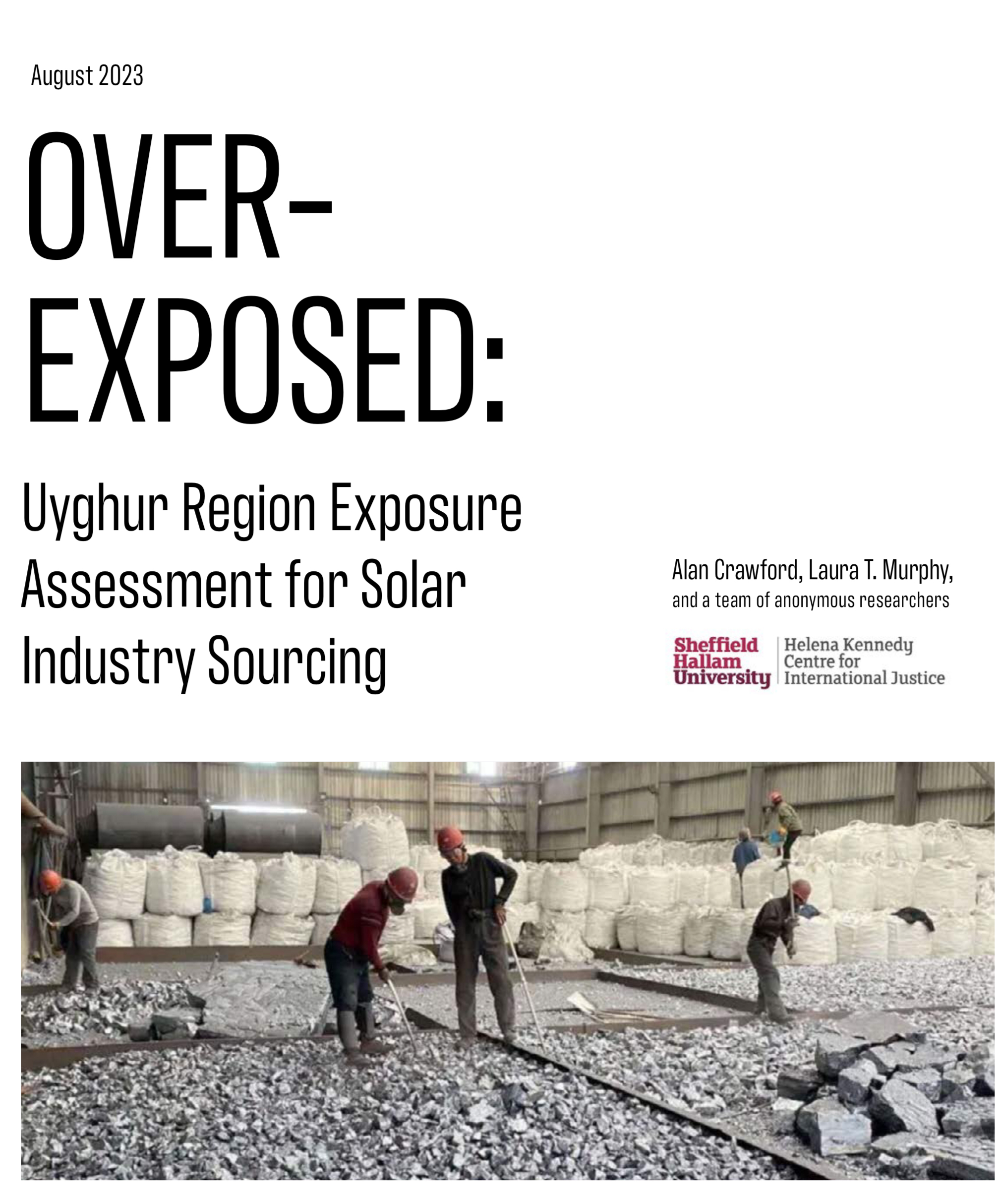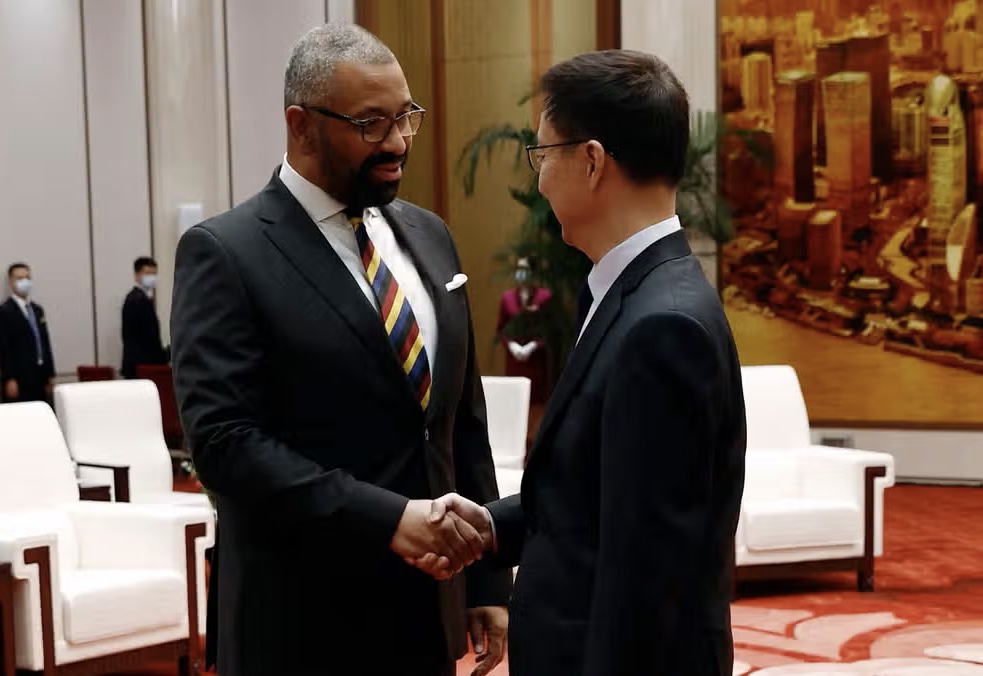Alicia Kearns MP, Chair of the Foreign Affairs Select Committee, has accused the UK government of running the risk of becoming a dumping ground for products of forced Uyghur labour in Xinjiang province. She was speaking on Monday in advance of a debate in parliament on the energy bill on Tuesday 5th September.
Kearns, the Conservative MP for Rutland and Merton, who has the backing of a sizeable number of senior MPs from across all political parties, has proposed an amendment to the bill which will require all companies producing solar energy to prove their supply chains are free from slave labour.

The amendment has been tabled following the publishing of an 87 page report by the Foreign Affairs Committee based on evidence that up to 40% of the world’s supply of polysilicon – one of the key components in the solar supply chain, comes directly from the Xinjiang province in China. The report which was complied over a two year period presents an understanding that the majority of the polisilicon used, is manufactured using forced labour by Uyghur Muslims in the so called ‘vocational education and training centres’ which activists and human rights organisations refer to as concentration camps or in other abusive labour sites across the region.

It proposes that the UK government adopt a more coherent and unified approach to China if its so-called tilt towards the Asia-Pacific region is to succeed. Seemingly at odds with current UK government policy, the report argues that China, Beijing is:
‘a threat to the UK and its interests…the behaviour of the Chinese Communist Party is currently characterised by increased aggression’
The report also pressed for ‘zero tolerance of transnational repression’ and argued that the government should be prepared to expel foreign diplomats involved in intimidating or attacking British citizens or those given refuge in the UK’. This was a reference to the allegations made earlier this year which suggested that China was operating ‘unofficial police stations’ in the UK and as many as 100 similar stations worldwide.
Fifteen human rights groups urge international community to take action against persecution and forced labour
Fifteen human rights groups, all members of the ‘Coalition to End Forced Labour in the Uyghur Region’, have published an open letter urging the international community to take action to prevent the use of forced labour in this region. The Chinese government is concerned that if the Kearns’ amendment is passed, it will effectively lead to a ban on all trade from the Xinjiang province.
Harsh criticism by fellow MPs of Foreign Secretary’s visit to China
The UK Foreign Secretary, James Cheverly’s visit to China last week, was met with harsh words from MPs belonging the influential Foreign Affairs Committee, who published a report urging ministers to call-out China’s repressive and abusive rights record both in China and overseas. It said:
‘The Chinese Communist Party (CCP) is seeking to silence criticism of its human rights abuses and impose its foreign policy and Xi Jinping’s thought beyond its own borders. This is a challenge to the functionality of democracies globally’
The committee members further accused James Cleverly, the Foreign Secretary, quite deliberately of leaving a void in the government’s policy on matters of engagement with China. They urged the minister to look beyond the trade benefits of any cooperation agreements and the sought after cooperation on issues such as climate change, and to not abandon western values.
Nothing but words
Rahima Mahmut, the Director of the World Uyghur Congress based in London, writing in the Guardian and the Spectator in the days preceding the visit, condemned the softly, softly approach of the Foreign Secretary, who she said was justifying engagement with ‘perpetrators of genocide’ by suggesting that his meetings – the first meeting by a minister of state in China in 5 years, allowed him to raise the human rights issues in private. She said his approach shows that:
‘The UK government has nothing but words in response and fails to stand up for its values’
She further accused the UK government of refusing to recognise and acknowledge that China has been responsible for a concerted Genocide programme in accordance with the findings of reputed human rights organisations and independent tribunals. She said the UK government was guilty of:
‘.failing to protect the Uyghur people from genocide, but the concerted efforts to deny the facts and wilful ignorance across politics, business and civil society in the UK’
Some of our most respected universities are demonstrating ‘wilful ignorance’
Rahima Mahmut, went further to point the finger at the ‘wilful ignorance’ of some of our major universities whose actions formed part of the process of ‘turning a blind eye’ to what was going on in the Xinjiang province. She cited Russell Group institutions such as Cambridge, Oxford and Exeter Universities, who she says have all undertaken joint research project collaborations with Chinese Tech firms such as BGI Genomics – a firm which is heavily involved in abusive DNA collection from the Uyghur community. When asked to justify their engagement with BGI, the reply from the universities has always been the same, that they are not aware that any ‘specific claims on data privacy have been raised with the university’
Rahima Mahmut ends her submissions by asking:
‘What more has to transpire before the UK and the Wider international community replace short-term interests with a resolute and firm declaration to human rights?


















